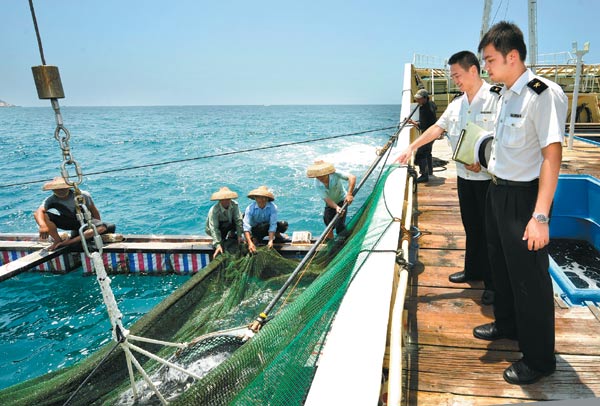Islands 'purchase' hurts major industry sectors
Updated: 2012-09-22 02:21
By Li Jiabao and Wang Wen (China Daily)
|
||||||||
Travel, aviation companies report cancellations, car sales also affected
Japan's "purchase" of China's Diaoyu Islands is having an economic impact on the two Asian economic powers across a range of key industry sectors, particularly travel and tourism.
Meanwhile, China is ramping up its customs inspections for Japanese products arriving at its ports, companies said on Friday.
 |
|
Customs officers inspect a vessel loaded with fish from Japan in Wenchang, Hainan province. China is strengthening customs inspections for Japanese products arriving at ports. Song Guoqiang / For China Daily |
"We've heard from our employees in China that some Japanese products arriving at Chinese ports are facing stricter customs procedures," Tsutomu Suehara, a spokesman for Japanese trading house Sojitz, was quoted as saying by AFP.
Wang Yuzhu, a researcher at the National Institute of International Strategy at the Chinese Academy of Social Sciences, said: "The most immediate influence is on tourism and consumption of Japanese products, while the impact on Japanese investment will last as long as three or five years."
China Comfort Travel Group Co Ltd started to cancel its tour groups to Japan on Sept 11, when it announced it would stop selling all Japan tour products at the agency's 5,500 stores across China.
In Beijing, all its Japan tour groups booked between Sept 16 and Oct 8 were cancelled and customers were refunded, said Yao Yao, head of the agency's marketing department.
"Almost 400 people in Beijing withdrew from tour groups. It is uncertain when the groups could be reorganized, and the effect on the business may last to the end of this year."
Hainan Airlines Co Ltd, which runs a weekly charter flight between Beijing and Okinawa-ken, cancelled the flight on Thursday because of insufficient passengers, said Dong Jun, the airline's public relations manager.
Japan Airlines Co Ltd said it would reduce its daily flights to China, excluding Hong Kong, by three to 10 until Oct 27, while the Nikkei Business Daily said JAL had about 12,000 cancellations on flights between September and November, including 5,500 seats cancelled flying out of Japan and 6,500 seats cancelled from China.
Shares in the airline had slumped 4.29 percent by the close on Friday, just two days after the carrier relisted in the second-largest initial public offering of the year.
She Xing, a researcher at the Economic Information Department of Japan External Trade Organization, said that a spontaneous boycott of Japanese brands had seriously affected sales across the country, the most dramatic of which had been a slump in willingness by Chinese to buy Japanese automobiles.
The country's automakers are reported to have lost $250 million in output owing to suspension of operations in China, caused by protests this week, and they now also face the risk that sales will halt altogether in the world's largest car market, according to an estimate by IHS Automotive.
"This impact will continue, depending on the development of the dispute," She said.
Chinese customs were reported to have stepped up customs inspections of Japanese products, and Japan's Chief Cabinet Secretary Osamu Fujimura said that Japan will respond appropriately to the situation.
"We notice the tightening of customs clearance, but currently we are not sure it's targeting Japanese products," She said.
The Ministry of Commerce also launched an anti-dumping investigation into imported pyridine from Japan and India.
The authorities will examine whether and to what extent such imports hurt the Chinese pyridine industry, according to a ministry statement.
The probe is expected to end within a year and could be extended for another six months, it said.
Pyridine is an organic compound used as an important raw material and solvent in the production of pesticides, drugs, animal feed, food additives and other chemicals.
A Reuters poll on Friday showed that 41 percent of Japanese companies see the islands dispute affecting their business plans.
China is Japan's biggest trade partner with bilateral trade worth $340 billion in 2011. Japan's exports to China accounted for 19.7 percent of Japan's total exports in 2011.
Contact the writers at lijibao@chinadaily.com.cn and wangwen@chinadaily.com.cn

 Relief reaches isolated village
Relief reaches isolated village
 Rainfall poses new threats to quake-hit region
Rainfall poses new threats to quake-hit region
 Funerals begin for Boston bombing victims
Funerals begin for Boston bombing victims
 Quake takeaway from China's Air Force
Quake takeaway from China's Air Force
 Obama celebrates young inventors at science fair
Obama celebrates young inventors at science fair
 Earth Day marked around the world
Earth Day marked around the world
 Volunteer team helping students find sense of normalcy
Volunteer team helping students find sense of normalcy
 Ethnic groups quick to join rescue efforts
Ethnic groups quick to join rescue efforts
Most Viewed
Editor's Picks

|

|

|

|

|

|
Today's Top News
Health new priority for quake zone
Xi meets US top military officer
Japan's boats driven out of Diaoyu
China mulls online shopping legislation
Bird flu death toll rises to 22
Putin appoints new ambassador to China
Japanese ships blocked from Diaoyu Islands
Inspired by Guan, more Chinese pick up golf
US Weekly

|

|







